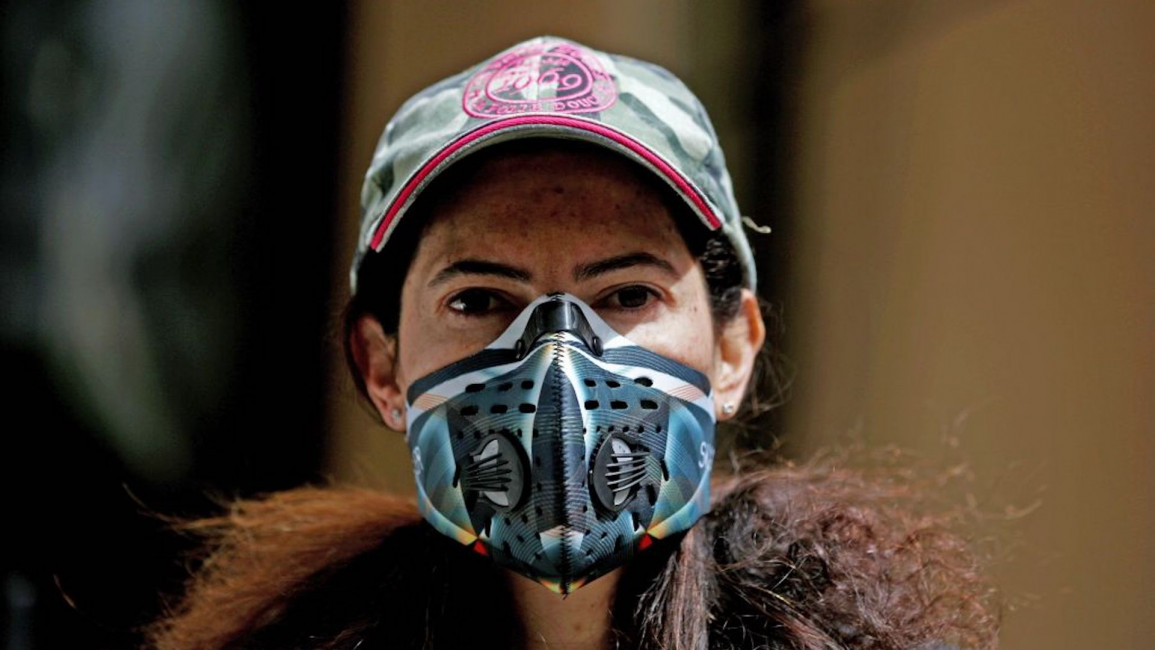Domestic violence hotline won't save all women from abuse during coronavirus lockdown, warns Lebanon NGO
Lebanon's women are at high risk of physical abuse under lockdown, even with a police hotline for domestic violence, a feminist NGO combatting abuse told The New Arab.
The comments came after reports this week said two girls, 17 and 20, had resorted to jumping from the second floor of their Beirut apartment to escape an alleged abusive father. One fell on a car and escaped, while the other was hospitalised.
Another woman who had separated from her husband eight months ago was reportedly stabbed six times in her Bekaa home, where she was staying with her children.
On Tuesday, the Internal Security Forces detained the father of a young Syrian girl, who died with traces of physical abuse on her body, a police report said.
Lebanon's national police recently resurfaced its domestic violence hotline, after the number of calls reporting abuse doubled due to a nation-wide coronavirus lock-down, coupled with a collective build-up of stress induced by the country's economic woes.
Twitter Post
|
The ISF 'family violence' hotline – launched in 2018 – was brought back to the fore by the security agency at the end of March, a month that saw a two-fold increase in reported family violence cases.
Comparing figures recorded in March this year to figures from March 2019, a security source told The New Arab that police records showed the number of calls received within the month had since then doubled.
Last year, ISF's hotline received 44 calls in March. This year, it was 88, the source said.
After responding to the call, the course of action taken by the police depends on individual cases, the security source explained. But for first-time offences, abusers often sign a written pledge to refrain from violent acts and behavior.
In the case of more severe violent incidents, or repeated-offences, the source said, the police detain the suspect after an initial investigation, and the case is referred to the judiciary for prosecution. The reported suspect can be jailed if found guilty, he explained.
This, according to a report released by KAFA (Enough) – a Lebanese NGO combating gender-based violence – showed a problematic pattern of alleged abusers re-engaging in abusive behavior after signing the paper.
The report recounted the experiences of women who had reported their partners.
"Days ago, Amal [a pseudonym] was subjected to physical violence by her husband. She left her home and went to stay with her parents, but she couldn't take her two kids," KAFA wrote.
"The next day, the husband pledged not to hit her again at the police station, and she went home. Only it wasn't his first such pledge," the report said.
Due to the current coronavirus spread, the Internal Security Forces are currently refraining from detaining or arresting people, including repeat cases, Layla Awada, head of the Family Violence Unit at KAFA told The New Arab.
 |
Because of the coronavirus, the police don't want to immediately arrest people to avoid crowding detainment centers and jails. Before, they were arresting them Layla Awada, head of the Family Violence Unit at KAFA |
 |
As a first step, the NGO directs women reaching out to them to the hotline. Once the case is investigated by the police and referred to the court. KAFA then directs the women to a judge, who will further investigate and issue a restraining order if neccessary to eliminate immediate threat to the victim.
Before the pandemic, the person alleging abuse needed to see a doctor and get a report. But as medical facilities are overstretched and can become a breeding ground for the virus, KAFA is coordinating with judges to help women bypass this step.
|
"Today we posted that for the first time, a judge heard the victim through a video call and issued a court decision, because [the victim] can't leave her house and go to a doctor," Awada said.
The judge, Hala Naja, issued two restraining orders – more specifically exclusion orders – which force the husband to leave the house for a period designated by the court, following a protection appeal filed by the victim.
While the unprecedented move provides a glimmer of hope for some victims, not all victims of abuse may have access to phone calls.
Many women, especially refugees trapped in camps, do not have access to a working phone.
Others lack the privacy from their abusers to call, Awada said.
"This is what we know, based on cases that we had before. They used to find a way to reach us while their husbands were away, often at work. Of course now these women won't be able to come to us," she added.
An initial intervention might be necessary for women undergoing abuse. Otherwise, many cases will slip under the police radar. "Unfortunately this is our prediction. In a lot of cases, women don't have the freedom to call," she added.
Gasia Ohanes is a journalist with The New Arab.
Follow her on Twitter: @GasiaOhanes



